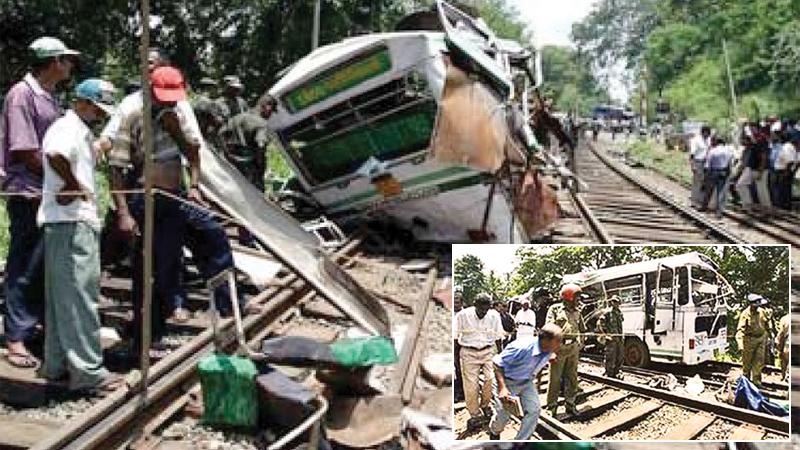
Fines for seven traffic law violations will be increased to Rs. 25,000 following the decision made by the Transport and Civil Aviation Ministry, on November 21. Violating railway crossing rules is among the listed seven traffic rule violations.
The other violations for which a minimum of Rs. 25,000 fine will be imposed are: driving under the influence of alcohol, driving without a valid driver’s licence, allowing a person who does not have a valid driver’s licence to drive a vehicle, excessive speeding, overtaking from the left and driving without an insurance certificate. The government says, the sole reason for imposing such high fines is to re-establish road discipline, encourage people to follow road rules and thereby reduce the number of accidents. According to Railway authorities when considering train accidents, due to derailment or unprotected/protected level crossings, it is important to note that such incidents can be prevented if people abide by the basic road rules.
However, there have been instances where mechanical failure has lead to fatal accidents.
As per the statistics of the Department of Railways, in 2016, up to September four people have died and 18 casualties reported, of which the majority was due to negligence when using railway crossings.
Unprotected railway crossings
Operating Superintendent of Railways, Colombo Division, V.S Polwattage, speaking to The Sunday Observer, said, “there are no “unprotected railway crossings.”
 “Almost every level crossing is protected and in addition, the Railway Department has put up sign boards and warnings on railway platforms and at level crossings, indicating that the public should be careful when getting across these level crossings,” he added. Polwattage said, there are private level crossings as well, manned by private individuals, and they are responsible for any deaths, casualties or other damage caused at the level crossing.
“Almost every level crossing is protected and in addition, the Railway Department has put up sign boards and warnings on railway platforms and at level crossings, indicating that the public should be careful when getting across these level crossings,” he added. Polwattage said, there are private level crossings as well, manned by private individuals, and they are responsible for any deaths, casualties or other damage caused at the level crossing.
“If there is a railway crossing, a road user must be careful when crossing it. Be it a driver or a pedestrian, he or she should check both sides before crossing the railway line,” he said.
Explaining that it is an offence to walk through a level crossing when it is closed, he said, “According to the Traffic Ordinance, such people can be arrested and produced in court for attempted suicide.”
Polwattage admitted that there are places where the road is broad and thereby causing practical difficulties when using barriers. In such instances, only a half barrier is used and sometimes cyclists and passengers creep through the small gap.
Acting Police Public Relations and Media Co-ordination Division, DIG Priyantha Jayakody also agreed that accidents on railway crossings are due to drivers disobeying the signals.
“If you analyse the manner in which these accidents have taken place, it is clear that most of the time the cause is, not whether the railway crossing is protected or not, but the driver’s recklessness,” he said.
Recalling an incident in the Kandana-Rilaulla area, in which two people died due to their carelessness, DIG Jayakody said, in that incident the driver had not heard the alarm since the radio was turned on full volume and he could not see the signal lights well, it being daytime.
“Also, there had been an instance where the absence of the gatekeeper had resulted in a fatal accident on the railway crossing,” he said.
Nihal Perera (45) a train commuter for more than 15 years, said, one of the main reasons for accidents on railway crossings is reckless driving. “Failure to put up protected crossings is another reason for such tragic incidents and the authorities should take immediate action to put an end to this issue,” he said.
Further elaborating, Perera pointed out the fact that a majority of the pedestrians and motorists are in such a hurry that they tend to cross the railway track even when the gates are closed.
DIG Jayakody also emphasized the issue of the driver failing to notice the different levels of the road and the crossing. “The position of the gear is very important. The use of mobile phones while driving, even using a hands-free phone is not advisable since people tend to concentrate on the conversation and forget the fact that they are on the road, driving a vehicle. It is the most common cause for accidents, in general,” he said.
Andrew Jeyarajan (32) who travels to work in his own vehicle said, he has never thought of the fine, but only of the reason why he should stop when the barrier is put up.
“I have always thought about my life and not about how much I will be fined if I do not stop at a level crossing. I know why such crossings are situated and the purpose of the barriers,” he added.
Although unaware of the increased fine for violating railway crossing rules, Shanaka Gunaratne (30) working for the corporate sector said, “Unlike those days people are very busy now, even when they are on the road. They are constantly checking their phone or social media sites. So, their situation awareness is very low,” he said.
